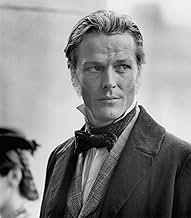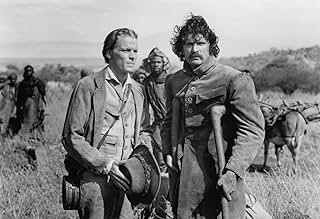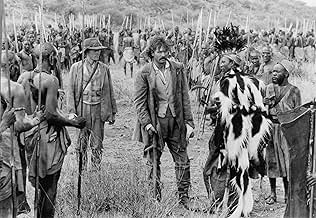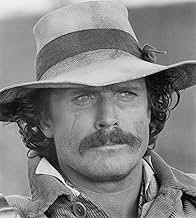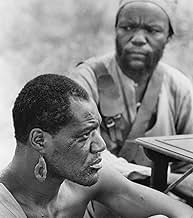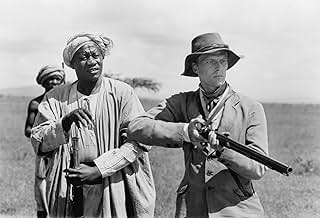IMDb-BEWERTUNG
7,1/10
4573
IHRE BEWERTUNG
Die legendäre wahre Geschichte der turbulenten Expedition von Kapitän Richard Francis Burton und Leutnant John Hanning Speke auf der Suche nach der Quelle des Nils.Die legendäre wahre Geschichte der turbulenten Expedition von Kapitän Richard Francis Burton und Leutnant John Hanning Speke auf der Suche nach der Quelle des Nils.Die legendäre wahre Geschichte der turbulenten Expedition von Kapitän Richard Francis Burton und Leutnant John Hanning Speke auf der Suche nach der Quelle des Nils.
- Auszeichnungen
- 1 wins total
Empfohlene Bewertungen
Every time I watch "Mountains of the Moon," I grow more and more fascinated by it. An epic drama and adventure, an exploration of what makes a hero and the value of friendship... this movie is a marvel.
I barely know where to begin. The acting is exceptional, of course. Patrick Bergin really makes Captain Richard Francis Burton come alive, so much so that I started reading up on Burton on my own after seeing the movie. His Burton is a man of great courage and insatiable curiosity, but also of great pride (the film only hints at Burton's infamous sexual escapades). Iain Glen brings great depth to John Hanning Speke, a man who desires greatness but cannot escape his fundamental weakness. It would have been so easy to make these two characters into square-jawed cartoons or place them in the easy Great Hero / Cowardly Villain mold, but director Bob Rafaelson, the script, and the actors wisely give us three-dimensional real people.
While I was watching this movie, I felt like I was actually transported to Africa in the 1850s, when the first explorers ventured into what was truly the Dark Continent. You see Burton and Speke's expedition endure weather, illness, injury, and attacks by hostile tribesmen, bringing home the reality of how dangerous these expeditions really were. By the time the film ended, I felt I had been to Africa itself.
If you want to see a real epic and a fine, exciting film, this is the one to see.
I barely know where to begin. The acting is exceptional, of course. Patrick Bergin really makes Captain Richard Francis Burton come alive, so much so that I started reading up on Burton on my own after seeing the movie. His Burton is a man of great courage and insatiable curiosity, but also of great pride (the film only hints at Burton's infamous sexual escapades). Iain Glen brings great depth to John Hanning Speke, a man who desires greatness but cannot escape his fundamental weakness. It would have been so easy to make these two characters into square-jawed cartoons or place them in the easy Great Hero / Cowardly Villain mold, but director Bob Rafaelson, the script, and the actors wisely give us three-dimensional real people.
While I was watching this movie, I felt like I was actually transported to Africa in the 1850s, when the first explorers ventured into what was truly the Dark Continent. You see Burton and Speke's expedition endure weather, illness, injury, and attacks by hostile tribesmen, bringing home the reality of how dangerous these expeditions really were. By the time the film ended, I felt I had been to Africa itself.
If you want to see a real epic and a fine, exciting film, this is the one to see.
When this film came out in 1990, it disappeared from the theaters as quickly as it came. Which is a shame really, because MOUNTAINS OF THE MOON is an excellent historical drama about the search for source of the Nile. The film is beautifully photographed on real African locations. I hate to call this film an epic, because that word has bad connotations today, and the film does not suffer from "epicitis" like so many films dubbed "epics". But MOUNTAINS OF THE MOON is an epic in the positive sense of the word.
The cast is uniformally good. A lot has already been written in this forum by others about the leads so I won't say anymore. Supporting player Delroy Lindo sometimes steals the show with his excellent role as the expeditions African guide.
I recommend you rent this along with STANLEY AND LIVINGSTONE for a night of good viewing.
Till next time...Your pal Jim.
The cast is uniformally good. A lot has already been written in this forum by others about the leads so I won't say anymore. Supporting player Delroy Lindo sometimes steals the show with his excellent role as the expeditions African guide.
I recommend you rent this along with STANLEY AND LIVINGSTONE for a night of good viewing.
Till next time...Your pal Jim.
I have to admit that, before it was shown on television a few weeks ago, I had never heard of the movie. When I see how many people wrote a review or voted for this movie on IMDb, I guess I'm not the only one. It's clear to me that this is a movie that has never had any attention. Not from the public, the cinema's nor the festivals. Even journalist didn't pay much attention to it. Does that mean this movie isn't worth seeing? Certainly not, although the subject probably isn't very attractive to the mainstream audience.
The movie tells the story of Burton and Speke, two friends and explorers who tried to find the source of the Nile in the middle of the nineteenth century. Burton was more of an anthropologist who wanted to learn more about the indigenous tribes which they encountered on their journeys, while Speke was more interested in the discovery of the source itself. Once they were back home they become enemies, because Speke tells everybody who wants to hear it that he alone discovered the source of the Nile, namely Lake Victoria.
There are different things that I liked about this movie. The acting was very good, the costumes were nice, but what I really liked were the images from the African landscapes, the animals, the people... Seeing the images from England just made me look forward to the next scenes in Africa. It never felt right to see these two explorers in England, you're always left with the feeling that they belong in Africa. I guess that is where the strength of this movie lies ... It makes you feel exactly the way these men felt. I reward this little masterpiece with an 8/10.
The movie tells the story of Burton and Speke, two friends and explorers who tried to find the source of the Nile in the middle of the nineteenth century. Burton was more of an anthropologist who wanted to learn more about the indigenous tribes which they encountered on their journeys, while Speke was more interested in the discovery of the source itself. Once they were back home they become enemies, because Speke tells everybody who wants to hear it that he alone discovered the source of the Nile, namely Lake Victoria.
There are different things that I liked about this movie. The acting was very good, the costumes were nice, but what I really liked were the images from the African landscapes, the animals, the people... Seeing the images from England just made me look forward to the next scenes in Africa. It never felt right to see these two explorers in England, you're always left with the feeling that they belong in Africa. I guess that is where the strength of this movie lies ... It makes you feel exactly the way these men felt. I reward this little masterpiece with an 8/10.
"Mountains of the Moon" is the kind of epic that seems to need a director like Bob Rafelson. I hoped this would be his "Lawrence of Arabia," but something goes amiss in the construction of the drama which Rafelson coauthored. For instance, we learn more about the two protagonists in two single lines than the 40 minutes that begin the film: Speke: (asking permission to organize some specific details of setting up an expedition in to the interior of Africa) responds, "I already have"; and for Burton: (a voice over) "Dear Isabelle
." The meandering, surprisingly cruel, first 40 minutes of the film become irrelevant.
Speke and Burton's search to find the source of the Nile is great material for a film. The scenery alone would lead any director to jump at the chance, but as so often occurs with films about Africa, the Continent overpowers the human drama. Rafelson is a master of human intimacy, and this story of two men's friendship which turns to rivalry is badly mangled by the screenplay. Burton's life alone is a huge trove for the subject of a film, and Rafelson seems to never grip the nature of these men, the essence of the story nor how to tell it.
Yet, the film is worth spending time with only to lavish in the effort of these two men and perhaps the last time when "discovery" meant a places on a map.
Speke and Burton's search to find the source of the Nile is great material for a film. The scenery alone would lead any director to jump at the chance, but as so often occurs with films about Africa, the Continent overpowers the human drama. Rafelson is a master of human intimacy, and this story of two men's friendship which turns to rivalry is badly mangled by the screenplay. Burton's life alone is a huge trove for the subject of a film, and Rafelson seems to never grip the nature of these men, the essence of the story nor how to tell it.
Yet, the film is worth spending time with only to lavish in the effort of these two men and perhaps the last time when "discovery" meant a places on a map.
A great story, beautifully filmed and acted about two Victorian era explorers. Irish-born Sir Richard Francis Burton, one of the greatest explorers in history, is in search of knowledge. English-born dilletante John Hanning Speke joins Burton's quest in search of glory. Together they search for the answer to one of the most elusive geographical questions of their time - what is the Nile's source? The film accurately shows how the Royal Geographical Society and other outside interests played Burton and Speke against each other for their own gain.
The film's tagline really says it all: "Two strangers made friends by a savage world. Two friends made enemies by a civilized world."
The film's tagline really says it all: "Two strangers made friends by a savage world. Two friends made enemies by a civilized world."
Wusstest du schon
- WissenswertesThe spear through Burton's face was an actual event, although the scar as depicted was wrong. The spear split his palate, causing a serious internal fracture of the jaw. It also came close to severing his tongue and it knocked out a half-dozen teeth, as well. The fact that he could survive such an extreme injury was near miraculous.
- PatzerIn an scene set in 1854, Isabel is looking at a copy of "The Perfumed Garden" translated by Burton. Burton did not publish this translation until 1886. While Burton's translation was published in 1886, the original was written between 1410 and 1434. (Burton's unexpurgated translation, to be called "The Scented Garden", was still only in manuscript form when he died. Isabel burned it, believing that would help save his soul from damnation.)
- Zitate
Arab chief in Cairo: In this wilderness you will find only Allah's terrible whimsy.
- Crazy CreditsThis motion picture's opening title card reads: "East African Coast 1854".
Top-Auswahl
Melde dich zum Bewerten an und greife auf die Watchlist für personalisierte Empfehlungen zu.
- How long is Mountains of the Moon?Powered by Alexa
Details
Box Office
- Budget
- 19.000.000 $ (geschätzt)
- Bruttoertrag in den USA und Kanada
- 4.011.793 $
- Eröffnungswochenende in den USA und in Kanada
- 66.683 $
- 25. Feb. 1990
- Weltweiter Bruttoertrag
- 4.011.793 $
- Laufzeit
- 2 Std. 16 Min.(136 min)
- Farbe
- Seitenverhältnis
- 1.85 : 1
Zu dieser Seite beitragen
Bearbeitung vorschlagen oder fehlenden Inhalt hinzufügen



